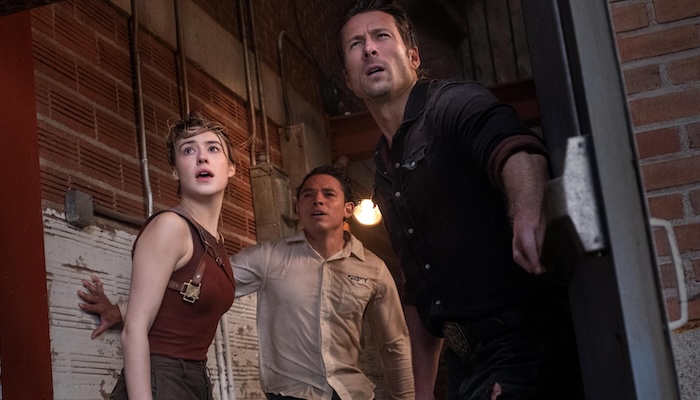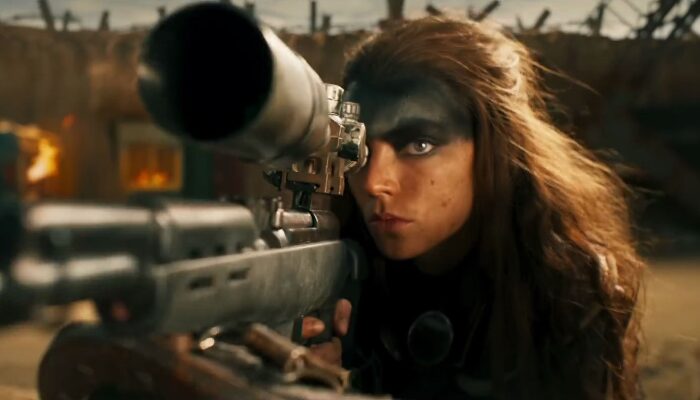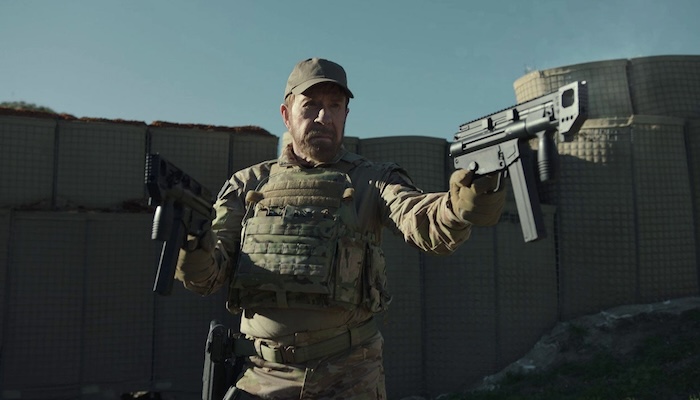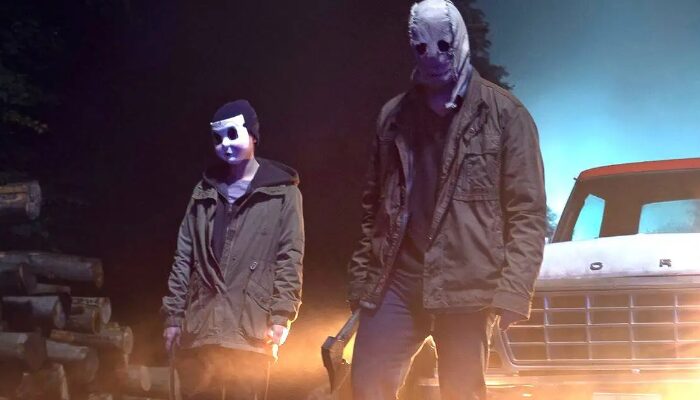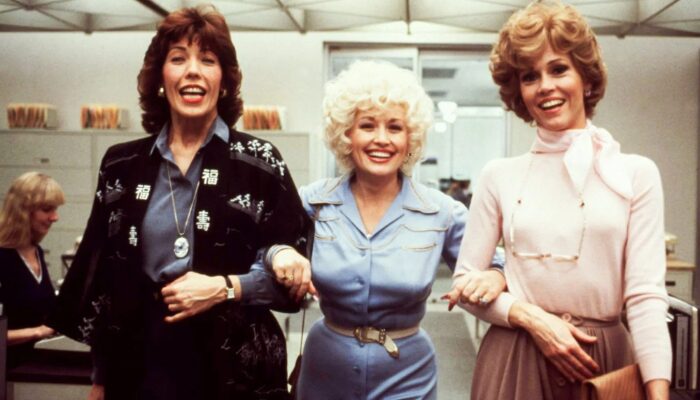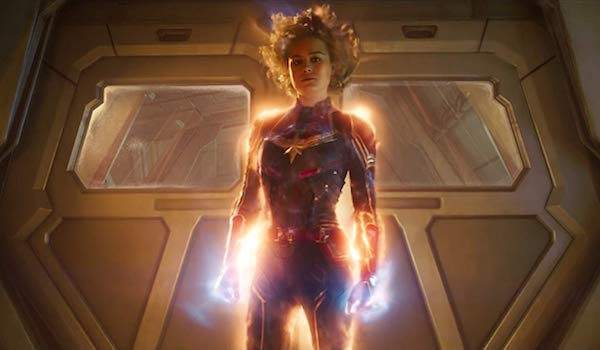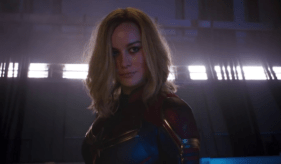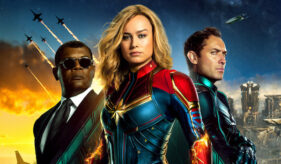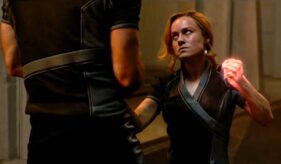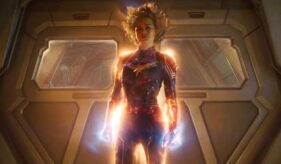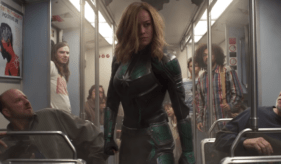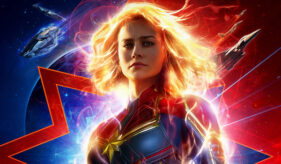Film Review: CAPTAIN MARVEL (2019): An Empty Origin Story Movie that Steadily Declines into Boredom
Table of Contents
The Farm / Skrull Plot Turn
Once Vers reaches U.S. Air Force pilot Maria Rambeau (Lashana Lynch)’s home towards the end of the second act of Captain Marvel and the perfunctory amnesiac, past-discovery sequence begins, the entire film slows down. I don’t mean the slow down that happens in Joss Whedon‘s Avengers: Age of Ultron during the farm sequence where the viewer learns meaningful things about the on-screen characters. I’m referring to the hackneyed, abyss type-of-slow-down that Captain Marvel tumbles into where cartoon bad guys, sub-par reversals, and flat reveals exist.
In its writing and how it is handled, this is the most boring section of Captain Marvel and features a tedious plot turn – the Skrulls are good guys and the Kree are the bad guys, with Talos being a jovial and proper gentleman. It is a dull, unimaginative plot twist with no foundation, whatsoever, in the film. It literally comes out of nowhere and is supposed to introduce a positive and rewarding new element to the narrative i.e. shake things up while upping the dramatic ante. It does not accomplish that goal because the plot twist is pathetic. This reveal and plot turn makes the film and the narrative worse, not better.
A good plot turn or late script reveal, like in Christopher Nolan‘s The Prestige, ameliorates the narrative, makes the viewer question and revisit previous scenes (e.g. seeing characters in a new light), and galvanizes the remainder of the film. This took place during the box scene in David Fincher‘s Seven and Esther’s true identity moment in Jaume Collet-Serra‘s Orphan. The reveal / plot-turn in Captain Marvel immediately flat-lines because: a.) the viewer doesn’t care about anyone or anything on-screen when it occurs and b.) the banal nature of the plot twist.
The Infamous Bar Scene
The bar scene where Agent Fury mysteriously finds Vers is entirely illogical and may be the worst scene in Captain Marvel.
Case and point – Vers endeavors to determine if Nick Fury is in fact Nick Fury. How does she know, regardless of his answers, if he is telling her the truth or not? Vers doesn’t know Fury, has no personal or professional knowledge of him. How does she know, based upon his answers, that Fury isn’t: a.) a Skrull, b.) a criminal, or c.) some out-of-work actor pretending to be C-53 law enforcement? Vers does not know, which means she should not trust Fury. Vers has no way of assessing the validity of Fury’s answers so this horrendous scene serves no purpose in the film’s narrative. Since the scene serves no purpose, why is it in the film?
What were the screenwriters going for with this worthless scene? It’s like the viewer is watching a deleted scene that has been reintegrated back into the main film.
If the screenwriters had approached Vers and Fury from a serious perspective during this scene (and their initial meeting), Vers wouldn’t have trusted Fury for a second. That is what an intelligent and cautious soldier would have done, especially after what had happened on Torfa. The best course of action for Vers would have been to go it alone. Then Vers would have known with one hundred percent certainty that no Skrull was present.
Marvel, on the other hand, wanted a buddy-comedy starring Nick Fury and this appaling bar scene is the result of that desire.
The Fun House Laboratory
The fun house in the third act of Captain Marvel, Mar Vell (Annette Bening)’s hidden laboratory, is filled with 90’s nostalgia, games, equipment, containment cells, No Doubt, empty fight scenes, a Flerken, and the Tesserac (how did that end up there?).
What it isn’t filled with is tension.
This section of Captain Marvel is the definition of anti-climatic. Following the narrative disasters at the farm and bar, a slippery nail is thrust into a coffin slicked with tears from sardonic laughter. That laughter is at the steep declivity of Captain Marvel‘s plot-line.
This segment of Captain Marvel should house the largest gaggle of key moments in the film, the apex of Vers’ storyline i.e. Vers’ old team coming to retrieve her, that confrontation, and the moment Vers confronts Yon-Rogg about her past. These moments happen, sort of, but in a lukewarm, loosey-goose way. There is no weight to any of them. Vers, Yon-Rogg, and the Starforce team have no emotional depth thus they are incapable of displaying any, even when the film will benefit from it. Scenes abroad the fun house contain physical drama (e.g. the fights and the escape) but the scenes are dead when it comes to emotional tumult. Because of that, there is no emotional engagement during any of them for the viewer.
The scenes abroad Mar Vell’s ship are more concerned with Flerken / Groot jokes than any type of pivotal moment between reunited pupil and teacher. This type of narrative decision is emblematic of nearly the entire film.
Lack of Gravitas in the Final Three Fight Scenes
Screenwriters Boden, Fleck, and Robertson-Dworet show in the third act of Captain Marvel that they do not know what they are doing when it comes to sequencing or escalation in a screenplay.
What is the point of watching Vers fight Yon-Rogg at the end of the film after she is super-powered, has already beaten him and her old team, destroyed Kree missiles, and a Kree warship single-handedly?
The very proposition of said fight is anti-climatic and pointless by the time it occurs in the film.
It is equivalent to watching Rey fight the Praetorian guard in Star Wars: The Last Jedi – Rey is so overpowered with The Force by that point, having already beaten the trilogy’s main villain in the previous film, that the viewer knows the Praetorians do not stand a chance.
It’s the same with Vers vs. Yon-Rogg in the third act of Captain Marvel (and every other opponent she faces in the film) after she fully powers-up.
A more effective sequencing and escalation during this pivotal portion of the third act would have been: 1.) Vers fights Yon-Rogg (following an emotional dialogue exchange), 2.) then Vers fights the remainder of her former team (again, emotionally gut-wrenching for her because she likes them. Vers barely survives i.e. there are real stakes in the fight), and 3.) Vers powers up, heals herself, destroys the Kree missiles, and one of the Kree fleet ships.
That sequencing and escalation would have produced a rich and rewarding third act in Captain Marvel.
The viewer would have watched Vers face an escalation in the level of opponent she fought. The viewer would see Vers rise to the occasion, defeat an enemy only to face a far greater threat. At each escalation, there would have been greater stakes, greater reward, and greater mental strife for Vers because she would be doing things that part of her did not want to do.
Through Boden, Fleck, and Robertson-Dworet’s slipshod sequencing of the aforementioned third act events, this up-scaling, present in Iron Man and Captain America: The First Avenger, does not occur in Captain Marvel.
Instead, the viewer just watches overpowered Vers beat-up everyone and everything on-screen. It’s absolutely boring because everything thrown at her is irrelevant. Nothing in the film at that point can defeat her, she can’t be hurt, and there is no peril.
The Ending
Vers leaves our solar system at the end of Captain Marvel and the viewer leaves his or her movie theater seat, not caring about Vers, where she is going, or who she will encounter when she gets to her destination.
Rating: 2/10
Leave your thoughts on this Captain Marvel review and the film below in the comments section. Readers seeking to support this type of content can visit our Patreon Page and become one of FilmBook’s patrons. Readers seeking more film reviews can visit our Movie Review Page and our Movie Review Facebook Page. Want up-to-the-minute notifications? FilmBook staff members publish articles by Email, Twitter, Facebook, and Tumblr.
Related Articles
FilmBook's Newsletter
Subscribe to FilmBook’s Daily Newsletter for the latest news!


